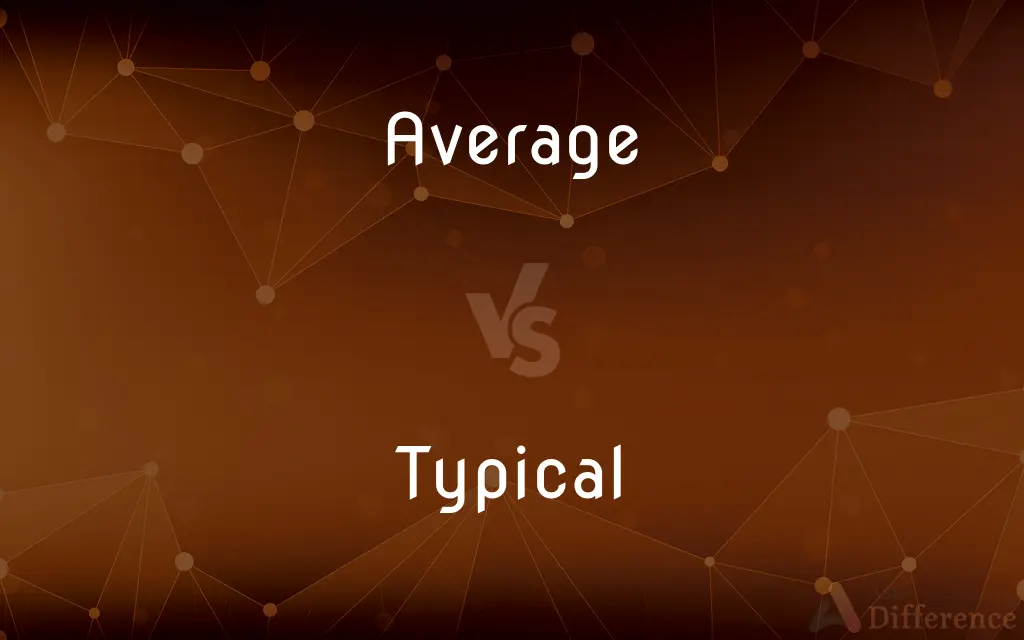Average vs. Typical — What's the Difference?
Edited by Tayyaba Rehman — By Fiza Rafique — Updated on April 3, 2024
Average refers to a mathematical mean, while typical denotes what is considered normal or standard within a group.

Difference Between Average and Typical
Table of Contents
ADVERTISEMENT
Key Differences
Average is a mathematical concept that represents the mean value in a set of numbers, calculated by dividing the sum of all values by their number. Whereas, typical describes characteristics or behaviors that are considered standard, common, or representative within a particular group or context.
The term average is often used in statistics and research to provide a quantitative measure that summarizes or represents a data set. On the other hand, typical is more qualitative, referring to what is generally expected or considered normal based on observations or common occurrences.
While average can help identify the central tendency of numerical data, offering insight into what is mathematically common, typical is used to describe qualitative aspects, such as traits, behaviors, or conditions that are frequently observed or expected within a specific context.
In practice, something average is specifically quantifiable and can be calculated or measured directly. In contrast, what is considered typical might vary based on subjective interpretations, cultural norms, or specific conditions of a group or environment.
Although both terms help in understanding norms and standards, average is primarily used in quantitative analyses to provide a summary statistic, whereas typical is used to convey an idea of what is normal or usual in qualitative terms.
ADVERTISEMENT
Comparison Chart
Definition
The mathematical mean of a set of numbers
What is considered normal or standard within a group
Nature
Quantitative
Qualitative
Usage
In statistics and research for numerical data
To describe standard characteristics or behaviors
Measurement
Calculated or measured directly
Based on observations or common occurrences
Variation
Identifies central tendency of data
Describes frequently observed or expected traits
Subjectivity
Objective, based on numerical calculation
Can vary based on subjective interpretations or cultural norms
Application
Used to summarize or represent data
Used to convey an idea of what is normal or usual
Compare with Definitions
Average
Often used in statistical analysis.
Analysts determine the stock's performance by calculating its average closing price over the past year.
Typical
Describes qualitative aspects of what is considered usual.
For a small town, it's typical to have a close-knit community feeling.
Average
The mean value of a set of numbers.
The average score of the class was 85.
Typical
Can vary based on subjective interpretations or cultural norms.
In a typical Italian dinner, pasta is often served as a first course.
Average
Calculated by dividing the sum of all values by the number of values.
The average temperature this week is calculated by summing each day's high and dividing by seven.
Typical
Denotes what is normal or standard within a specific context.
A typical breakfast in America includes eggs, toast, and coffee.
Average
Objective and quantifiable.
The average rainfall this month can be compared to historical data to assess climate trends.
Typical
Based on common characteristics or behaviors.
It's typical for him to arrive at least ten minutes early to meetings.
Average
Represents a central point in a data set.
The average age of participants in the study was 30 years.
Typical
Reflects general expectations or norms.
The typical response time for customer service queries is less than 24 hours.
Average
In colloquial language, an average is a single number taken as representative of a non-empty list of numbers. Different concepts of average are used in different contexts.
Typical
Exhibiting the qualities, traits, or characteristics that identify a kind, class, group, or category
A typical suburban community.
Average
A number expressing the central or typical value in a set of data, in particular the mode, median, or (most commonly) the mean, which is calculated by dividing the sum of the values in the set by their number
The proportion of over-60s is above the EU average of 19 per cent
Typical
Of or relating to a representative specimen; characteristic or distinctive.
Average
The apportionment of financial liability resulting from loss of or damage to a ship or its cargo.
Typical
Conforming to a type
A composition typical of the baroque period.
Average
Constituting the result obtained by adding together several amounts and then dividing this total by the number of amounts
The average temperature in May was 4°C below normal
Typical
Also typ·ic (-ĭk) Of the nature of, constituting, or serving as a type; emblematic.
Average
Amount to or achieve as an average rate or amount over a period of time; mean
Annual inflation averaged 2.4 per cent
Typical
Conforming with what usually happens
The bus is late again? That's so typical!.
Average
A number that typifies a set of numbers of which it is a function.
Typical
Capturing the overall sense of a thing.
Average
See arithmetic mean.
Typical
Characteristically representing something by form, group, idea or type.
Average
An intermediate level or degree
Near the average in size.
Typical
Normal, average; to be expected.
Average
The usual or ordinary kind or quality
Although the wines vary, the average is quite good.
Typical
(taxonomy) Of a lower taxon, containing the type of the higher taxon.
Average
(Sports)The ratio of a team's or player's successful performances such as wins, hits, or goals, divided by total opportunities for successful performance, such as games, times at bat, or shots
Finished the season with a .500 average.
A batting average of .274.
Typical
Anything that is typical, normal, or standard.
Antipsychotic drugs can be divided into typicals and atypicals.
Among the moths, typicals were more common than melanics.
Average
The loss of a ship or cargo, caused by damage at sea.
Typical
Of the nature of a type; representing something by a form, model, or resemblance; emblematic; prefigurative.
The Levitical priesthood was only typical of the Christian.
Average
The incurrence of damage or loss of a ship or cargo at sea.
Typical
Combining or exhibiting the essential characteristics of a group; as, a typical genus.
Average
The equitable distribution of such a loss among concerned parties.
Typical
Exhibiting the qualities or characteristics that identify a group or kind or category;
A typical American girl
A typical suburban community
The typical car owner drives 10,000 miles a year
A painting typical of the Impressionist school
A typical romantic poem
A typical case of arteritis
Average
A charge incurred through such a loss.
Typical
Of a feature that helps to distinguish a person or thing;
Jerusalem has a distinctive Middle East flavor
That is typical of you!
Average
(Nautical)Small expenses or charges that are usually paid by the master of a ship.
Typical
Conforming to a type;
The typical (or normal) American
Typical teenage behavior
Average
(Mathematics)Of, relating to, or constituting an average.
Average
Being intermediate between extremes, as on a scale
A movie of average length.
A player of average ability.
Average
Usual or ordinary in kind or character
A poll of average people.
Average eyesight.
Average
Assessed in accordance with the law of averages.
Average
(Mathematics)To calculate the average of
Average a set of numbers.
Average
To do or have an average of
Averaged three hours of work a day.
Average
To distribute proportionately
Average one's income over four years so as to minimize the tax rate.
Average
To be or amount to an average
Some sparrows are six inches long, but they average smaller. Our expenses averaged out to 45 dollars per day.
Average
(mathematics) The arithmetic mean.
2=The average of 10, 20 and 24 is (10 + 20 + 24)/3 = 18.
Average
(statistics) Any measure of central tendency, especially any mean, the median, or the mode.
Average
Financial loss due to damage to transported goods; compensation for damage or loss.
Average
Customs duty or similar charge payable on transported goods.
Average
Proportional or equitable distribution of financial expense.
Average
(sports) An indication of a player's ability calculated from his scoring record, etc.
Batting average
Average
In the corn trade, the medial price of the several kinds of grain in the principal corn markets.
Average
The service that a tenant owed his lord, to be done by the animals of the tenant, such as the transportation of wheat, turf, etc.
Average
(not comparable) Constituting or relating to the average.
The average age of the participants was 18.5.
Average
Neither very good nor very bad; rated somewhere in the middle of all others in the same category.
I soon found I was only an average chess player.
Average
Typical.
The average family will not need the more expensive features of this product.
Average
(informal) Not outstanding, not good, banal; bad or poor.
Average
(transitive) To compute the average of, especially the arithmetic mean.
If you average 10, 20 and 24, you get 18.
Average
(transitive) Over a period of time or across members of a population, to have or generate a mean value of.
The daily high temperature last month averaged 15°C.
I averaged 75% in my examinations this year.
Average
(transitive) To divide among a number, according to a given proportion.
To average a loss
Average
(intransitive) To be, generally or on average.
Average
That service which a tenant owed his lord, to be done by the work beasts of the tenant, as the carriage of wheat, turf, etc.
Average
A tariff or duty on goods, etc.
Average
A mean proportion, medial sum or quantity, made out of unequal sums or quantities; an arithmetical mean. Thus, if A loses 5 dollars, B 9, and C 16, the sum is 30, and the average 10.
Average
Any medial estimate or general statement derived from a comparison of diverse specific cases; a medium or usual size, quantity, quality, rate, etc.
Average
In the English corn trade, the medial price of the several kinds of grain in the principal corn markets.
Average
Pertaining to an average or mean; medial; containing a mean proportion; of a mean size, quality, ability, etc.; ordinary; usual; as, an average rate of profit; an average amount of rain; the average Englishman; beings of the average stamp.
Average
According to the laws of averages; as, the loss must be made good by average contribution.
Average
To find the mean of, when sums or quantities are unequal; to reduce to a mean.
Average
To divide among a number, according to a given proportion; as, to average a loss.
Average
To do, accomplish, get, etc., on an average.
Average
To form, or exist in, a mean or medial sum or quantity; to amount to, or to be, on an average; as, the losses of the owners will average twenty five dollars each; these spars average ten feet in length.
Average
A statistic describing the location of a distribution;
It set the norm for American homes
Average
Amount to or come to an average, without loss or gain;
The number of hours I work per work averages out to 40
Average
Achieve or reach on average;
He averaged a C
Average
Compute the average of
Average
Approximating the statistical norm or average or expected value;
The average income in New England is below that of the nation
Of average height for his age
The mean annual rainfall
Average
Lacking special distinction, rank, or status; commonly encountered;
Average people
The ordinary (or common) man in the street
Average
Of no exceptional quality or ability;
A novel of average merit
Only a fair performance of the sonata
In fair health
The caliber of the students has gone from mediocre to above average
The performance was middling at best
Average
Around the middle of a scale of evaluation of physical measures;
An orange of average size
Intermediate capacity
A plane with intermediate range
Medium bombers
Average
Relating to or constituting the most frequent value in a distribution;
The modal age at which American novelists reach their peak is 30
Average
Relating to or constituting the middle value of an ordered set of values (or the average of the middle two in an even-numbered set);
The median value of 17, 20, and 36 is 20
The median income for the year was $15,000
Common Curiosities
What does it mean if something is described as typical?
If something is described as typical, it means it conforms to what is generally expected or considered standard within a particular context.
What is the difference between average and typical?
Average is a specific quantitative calculation, while typical refers to what is considered normal or standard in a qualitative sense.
How is average calculated?
Average is calculated by adding all the numbers in a set and dividing by the total number of values.
Can the typical be quantified?
While typical refers to qualitative norms, it can sometimes be indirectly quantified through surveys or polls that gauge common behaviors or attitudes.
Is average always an accurate representation of data?
Average can provide insight into the central tendency, but it may not always reflect outliers or the distribution's range.
Why is understanding averages important?
Understanding averages is important for identifying central tendencies in data, which can inform decision-making and analysis.
Can something be average but not typical?
Yes, something can be mathematically average but not typical if it doesn't represent the usual or expected characteristics of a group.
Can average and typical be used interchangeably?
No, because average refers to a mathematical calculation, and typical refers to standard or common characteristics, making their use context-dependent.
How can something be atypical?
Something can be atypical if it deviates significantly from what is considered normal or standard within a specific context.
Why might researchers prefer average over typical in studies?
Researchers might prefer average for its objective, quantifiable nature, especially in statistical analysis, to summarize data accurately.
How does the concept of typical apply in social sciences?
In social sciences, typical is used to describe behaviors, attitudes, or conditions that are commonly observed within a particular group or society.
How do cultural norms affect what is considered typical?
Cultural norms play a significant role in defining what is typical, as they influence common behaviors, expectations, and standards.
Is it possible for typical characteristics to change over time?
Yes, what is considered typical can evolve due to changes in cultural norms, societal values, or technological advancements.
What role does average play in everyday decision-making?
Average can inform decisions by providing a summary statistic that helps evaluate options, trends, or risks.
Can technological advancements influence what is considered typical?
Yes, as technology evolves, it can change behaviors and norms, thereby shifting what is considered typical in various contexts.
Share Your Discovery

Previous Comparison
Dissolve vs. Melt
Next Comparison
Excellent vs. ExcellenceAuthor Spotlight
Written by
Fiza RafiqueFiza Rafique is a skilled content writer at AskDifference.com, where she meticulously refines and enhances written pieces. Drawing from her vast editorial expertise, Fiza ensures clarity, accuracy, and precision in every article. Passionate about language, she continually seeks to elevate the quality of content for readers worldwide.
Edited by
Tayyaba RehmanTayyaba Rehman is a distinguished writer, currently serving as a primary contributor to askdifference.com. As a researcher in semantics and etymology, Tayyaba's passion for the complexity of languages and their distinctions has found a perfect home on the platform. Tayyaba delves into the intricacies of language, distinguishing between commonly confused words and phrases, thereby providing clarity for readers worldwide.
















































